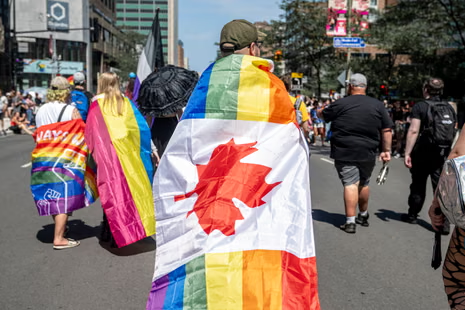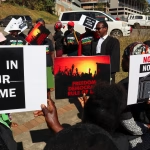As the United States prepares for another heated presidential election cycle, the possibility of Donald Trump’s return to the White House is creating anxiety for many communities. Among those most concerned are LGBTQ+ Americans, who fear that a second Trump presidency could roll back hard-fought rights and protections. This growing unease has sparked conversations about leaving the U.S. altogether, with Canada emerging as a favored destination for relocation.
- The Climate of Fear Among LGBTQ+ Americans
- Canada as a Safe Haven
- Migration Motivations: Beyond Politics
- Challenges of Relocating to Canada
- Stories of Those Who Left
- The Economic Impact of LGBTQ+ Migration
- Political Reactions to LGBTQ+ Relocation Fears
- Canada’s Perspective on Incoming LGBTQ+ Americans
- Global Context: LGBTQ+ Rights Under Threat Worldwide
- FAQs
- Why are LGBTQ+ Americans considering moving to Canada?
- Is it easy for Americans to immigrate to Canada?
- Has Canada seen an increase in LGBTQ+ migration from the US?
- What protections does Canada offer LGBTQ+ people?
- How could mass LGBTQ+ migration affect the U.S. economy?
- Would Canada benefit economically from LGBTQ+ American migration?
- Conclusion
The idea of seeking refuge across the northern border is not entirely new. During Trump’s first term, there was a noticeable uptick in Google searches about moving to Canada, particularly following policy announcements that targeted marginalized groups. But today, with more state-level restrictions on LGBTQ+ rights and a political environment marked by polarization, these conversations feel less symbolic and more like a genuine plan for survival. The question is not just whether Trump will win again—it’s about whether LGBTQ+ Americans feel they will still have a safe and secure place in their own country if he does.
The Climate of Fear Among LGBTQ+ Americans
The fear among LGBTQ+ communities is deeply rooted in both lived experiences and political developments. Under Trump’s first term, several federal protections were either weakened or eliminated. Transgender individuals, for instance, saw their right to serve openly in the military rescinded in 2017. Efforts to protect LGBTQ+ healthcare access were also rolled back, and the administration frequently aligned itself with conservative groups opposed to same-sex marriage and transgender rights.
While the Biden administration has sought to restore many of these protections, the political pendulum has created a sense of instability. LGBTQ+ Americans are left wondering whether the rights they enjoy today could be stripped away tomorrow. According to a 2023 Human Rights Campaign (HRC) survey, more than 70% of LGBTQ+ respondents said they felt less safe due to increasing political rhetoric against their community. This fear is not abstract—it has been compounded by real-world events, including the rise in hate crimes and state-level legislation targeting LGBTQ+ people, particularly transgender youth.
Canada as a Safe Haven
Canada has long cultivated an international reputation as a progressive, inclusive, and welcoming country for LGBTQ+ individuals. Same-sex marriage was legalized nationwide in 2005, making Canada one of the earliest countries to recognize marriage equality. Provincial laws ensure protections in housing, employment, and healthcare, and public sentiment toward LGBTQ+ rights tends to be far more favorable compared to certain U.S. regions.
For LGBTQ+ Americans, this makes Canada an attractive option. Cities like Toronto, Vancouver, and Montreal are not only culturally vibrant but also home to thriving queer communities. Annual Pride celebrations attract hundreds of thousands of participants, reinforcing Canada’s commitment to visibility and inclusion. The promise of safety, coupled with the possibility of starting fresh in a country that actively embraces diversity, is why many LGBTQ+ Americans are seriously considering Canada as their next home.
Migration Motivations: Beyond Politics
While Trump’s possible return is a major catalyst, the desire to move to Canada is not purely political. Many LGBTQ+ Americans also cite broader social and cultural factors. Rising hate crimes, divisive rhetoric, and state laws targeting LGBTQ+ rights—such as bans on gender-affirming care—have created an environment where daily life can feel increasingly hostile.
A 2022 report by the Williams Institute at UCLA School of Law found that LGBTQ+ individuals are nine times more likely to experience violent hate crimes compared to non-LGBTQ+ people. For transgender individuals, the numbers are even more alarming. These statistics reveal why safety is at the forefront of relocation conversations. Canada, by contrast, consistently ranks high on global LGBTQ+ safety indexes. For those who feel targeted in their own neighborhoods, crossing the border seems like the best possible escape route.
Challenges of Relocating to Canada
While the dream of moving to Canada offers hope, the reality is far more complicated. Immigration policies are strict, and applicants must meet specific requirements related to employment, education, and financial stability. Simply being LGBTQ+ or feeling unsafe in the U.S. does not automatically qualify someone for permanent residency.
Experts note that LGBTQ+ Americans considering relocation often underestimate the bureaucratic challenges. Securing work permits, applying for permanent residency, and navigating the Canadian healthcare system all require extensive planning. There is also the emotional toll of leaving behind families, jobs, and communities in the United States.
Even so, immigration lawyers in Canada report a noticeable increase in consultations from LGBTQ+ Americans exploring their options. While not everyone will follow through, the fact that so many are considering it highlights the depth of fear surrounding U.S. politics.
Stories of Those Who Left
To understand the human impact, it is important to look at individuals who have already made the move. Take Daniel, a gay man from Texas who relocated to Toronto in 2018. After repeated threats following his advocacy for LGBTQ+ rights in his hometown, he decided he could no longer live under constant fear. “Canada offered me a sense of peace I never had in the U.S.,” Daniel shared. “Here, I don’t feel like I have to hide who I am or worry that a new election could erase my rights.”
Similarly, transgender individuals have found Canada to be more supportive. Emily, a trans woman from Florida, moved to Vancouver after her state passed laws restricting access to gender-affirming care. “It was the hardest decision of my life, but I had to choose survival,” she explained. Her story is a stark reminder of how state-level policies can have life-altering consequences.
These personal narratives demonstrate that the decision to relocate is not just political—it is deeply personal and often driven by a desire for safety, dignity, and stability.
The Economic Impact of LGBTQ+ Migration
Another dimension of this conversation is the potential economic impact. LGBTQ+ individuals contribute significantly to the U.S. economy. According to a report by the LGBTQ+ Chamber of Commerce, LGBTQ+-owned businesses contribute over $1.7 trillion to the American economy annually. If large numbers of LGBTQ+ Americans were to emigrate, it could have ripple effects on entrepreneurship, cultural industries, and local economies.
Canada, on the other hand, stands to benefit from an influx of skilled, educated LGBTQ+ immigrants. With labor shortages in certain sectors, Canada could gain not only new citizens but also economic growth fueled by diverse contributions. This economic dynamic underscores how migration is not just a humanitarian or political issue, but also a matter of financial and social development.
Political Reactions to LGBTQ+ Relocation Fears
The idea that LGBTQ+ Americans are considering leaving has not gone unnoticed by political leaders. Progressive voices argue that such fears highlight the urgent need to protect civil rights at both federal and state levels. “When people feel they have to leave their own country to be safe, we have failed them,” one Democratic lawmaker remarked during a recent congressional hearing.
Conservatives, however, often dismiss these concerns as exaggerated. Some argue that the U.S. remains one of the most inclusive nations in the world and that fears of mass rights rollbacks are unfounded. This polarization mirrors the broader cultural divide in America, where LGBTQ+ issues are often caught in the crossfire of partisan politics.
Canada’s Perspective on Incoming LGBTQ+ Americans
From Canada’s viewpoint, the potential influx of LGBTQ+ Americans presents both opportunities and challenges. On one hand, it reinforces Canada’s reputation as a progressive, inclusive nation. On the other hand, it could place added pressure on housing, healthcare, and employment sectors, particularly in major cities already grappling with affordability crises.
Canadian policymakers have not formally commented on a potential wave of LGBTQ+ American migration, but the country’s immigration system is designed to evaluate applicants based on a points-based system that favors education, skills, and work experience. This means that not all LGBTQ+ Americans who wish to move will be able to do so easily.
Global Context: LGBTQ+ Rights Under Threat Worldwide
The fears of LGBTQ+ Americans must also be understood within a global context. Around the world, LGBTQ+ rights remain under constant threat. In some countries, same-sex relationships are criminalized, while in others, violence against queer individuals goes unpunished. Against this backdrop, Canada’s progressive stance becomes even more significant—it is not just a safe haven compared to the U.S., but also compared to much of the world.
This global dimension underscores the stakes of the upcoming U.S. election. The U.S. has long been viewed as a leader in human rights, but if LGBTQ+ protections erode under a second Trump term, America’s standing could weaken internationally.
FAQs
Why are LGBTQ+ Americans considering moving to Canada?
Many LGBTQ+ Americans fear that a second Trump presidency could lead to rollbacks of rights and protections. Canada is seen as a safer, more inclusive country with strong legal safeguards for LGBTQ+ individuals.
Is it easy for Americans to immigrate to Canada?
No. Immigration requires meeting strict criteria related to employment, education, and finances. While Canada is welcoming, LGBTQ+ Americans must go through the same processes as other applicants.
Has Canada seen an increase in LGBTQ+ migration from the US?
While official data is limited, immigration lawyers and advocacy groups report a noticeable increase in consultations from LGBTQ+ Americans exploring Canadian options.
What protections does Canada offer LGBTQ+ people?
Canada legalized same-sex marriage in 2005 and has strong anti-discrimination laws protecting LGBTQ+ people in housing, employment, and healthcare.
How could mass LGBTQ+ migration affect the U.S. economy?
If significant numbers of LGBTQ+ Americans left, the U.S. could lose valuable economic contributions, as LGBTQ+-owned businesses and workers play a major role in economic growth.
Would Canada benefit economically from LGBTQ+ American migration?
Yes. Skilled and educated LGBTQ+ immigrants could help fill labor shortages and contribute positively to Canada’s economy.
Conclusion
The prospect of Donald Trump’s return to the White House has created a wave of anxiety among LGBTQ+ Americans, many of whom are seriously considering relocating to Canada for safety, dignity, and stability. While Canada offers a strong legal framework and welcoming culture, the practical challenges of migration remain significant. Beyond the logistics, these discussions reflect a deeper issue: the fragility of civil rights in a polarized political climate.
For LGBTQ+ Americans, the choice to stay or leave is not just about politics—it is about survival. As the U.S. heads into another contentious election, the outcome will determine not only the direction of the nation but also the lives of countless individuals who must decide where they can live freely and without fear. The world is watching closely, and the stakes could not be higher.













